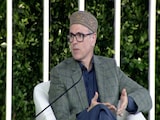Infosys co-founder NR Narayana Murthy has explained the thought behind his 70-hour work week advice, saying what he actually means is that an employee has to be "very productive". Mr Murthy was speaking to India Today and said he does not regret his previous statement. The 77-year-old had sparked a huge debate in the country when he suggested in October last year that India's work culture needs to change and that youngsters should be prepared to work for 70 hours a week.
Explaining the comment, Mr Murthy told India Today, "I used to work 85-90 hours a week till I retired. I received a scholarship right from my pre-university in 1961. All my friends who went to engineering college received a lot of help from the government in terms of their fees - a highly discounted figure. Therefore, my view has always been that those of us in India who have received so much benefit from the country from the taxpayer have an enormous responsibility to work very hard to bring a chance for the betterment of life of the poorer sections of the society. Therefore I don't regret it."
The entrepreneur also clarified that he doesn't think hours were important. "All that it means is, that you have to be very productive, you have to work very hard like the Germans did after World War I, like the Japanese did and we owe it to the poor people in our society to work hard and make the quality of their life a little bit better," said Mr Murthy.
The comment was originally made on former Infosys CEO Mohandas Pai's podcast 'The Record'. He had also talked about other topics like nation building, technology, his company Infosys and others.
When asked about his vision for the next 10, 15 years, Mr Murthy had highlighted a need to improve productivity in India and sort out the government delays.
The comments sparked a debate on social media, with many people agreeing with Mr Murthy's views, while several others criticising him. Reacting to widespread backlash, Mr Murthy had defended his statement and said a lot of "good people" and "NRIs" agreed with his statement.















